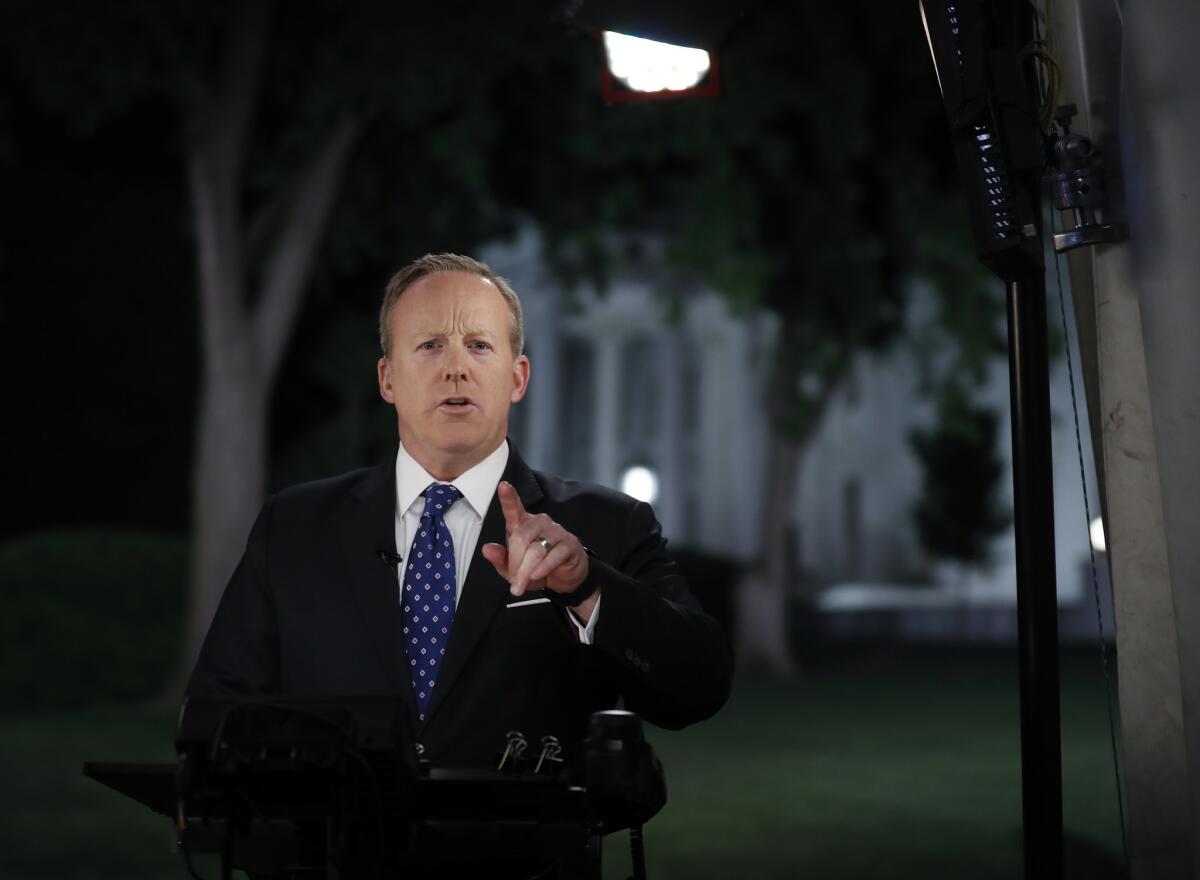As Trump defends his firing of Comey, White House spins a narrative of strength and decisive action

- Share via
Reporting from Washington — President Trump took to Twitter on Wednesday to defend his surprise firing of FBI Director James Comey, predicting he will eventually be praised for the move.
White House officials, meanwhile, spun a narrative of strength and decisiveness, even though many were unable to describe all the facts surrounding Trump’s decision.
The president, they said, acted on the recommendation of a career prosecutor with unimpeachable nonpartisan credentials, one who had been easily confirmed just weeks earlier. To ignore the case laid out by Deputy Atty. Gen. Rod Rosentstein’s would have been “malpractice,” one White House spokesman said, while others sought to undermine Democrats’ criticism of the abrupt move by pointing out Democrats themselves had expressed doubts about Comey. The president’s action, officials said, was quick and decisive.
“Here’s the bottom line: Comey had lost the confidence across the board -- from House members, from Senate members, from rank-and-file members of the FBI and the American public. When you have that happen, you can’t serve in that capacity,” Deputy Press Secretary Sarah Huckabee Sanders told reporters Tuesday night.
But neither Sanders nor Press Secretary Sean Spicer could answer with certainty key questions about what led to the bombshell move — one that came with little warning for most White House staff and to the FBI director himself.
Spicer had initially delivered the news to reporters shortly before 6 p.m. EDT Monday, before he and top press aides hunkered down in their West Wing offices.
Reporters descended on both hours later after they trekked outside to conduct television interviews. In the case of Spicer, he was peppered with questions in a driveway lighted only by a rising, nearly full moon over the White House.
Who ordered Rosenstein to assess whether Comey should continue to serve? “No one from the White House,” Spicer said. Did the president speak to Rosenstein after reading his memo? “I don’t know how the sequence went.” When was the last time the president spoke to Comey? “I don’t know.” How long after reading Rosenstein’s memo did the president decide to fire Comey himself? “I can look at the tick-tock.” And what was the president referring to when he wrote to Comey in his dismissal letter that the director had told him three separate times he wasn’t under investigation? “I don’t know.”
Spicer also could not say what other senior administration officials may have been part of a discussion with Trump about firing Comey, or whether the termination letter was vetted by key staff.
Pressed on the issue Tuesday morning, Sanders told MSNBC’s “Morning Joe” that she “can’t imagine” that the White House chief of staff, White House counsel and others “wouldn’t have seen that.”
Trump is not scheduled to appear in public Wednesday. The only event on the president’s public schedule is a private meeting in the Oval Office with the Russian Foreign Minister, Sergei Lavrov.
ALSO
One day ‘they will be thanking me!’ Trump says of Comey firing
Annotated letter: The Trump administration’s case for firing FBI Director James Comey
Trump urged Comey to go after Clinton — and then fired him for it
Trump fires Comey as FBI director; Democrats call for a special prosecutor in Russia investigation
More to Read
Get the L.A. Times Politics newsletter
Deeply reported insights into legislation, politics and policy from Sacramento, Washington and beyond. In your inbox twice per week.
You may occasionally receive promotional content from the Los Angeles Times.











